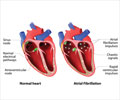A tiny deletion in the heart protein titin, affecting only embryonic ventricles, has major long-term effects, causing adult atrial fibrillation.

Transient titin-dependent ventricular defects during development lead to adult atrial arrhythmia and impaired contractility
Go to source). A recent study has found that a small deletion in the A-band of titin—removing just nine amino acids from the 27,000 to 35,000 amino acids in the full
‘A tiny nine-amino-acid deletion in titin briefly affects embryonic heart ventricles but has significant long-term effects, leading to adult #atrialfibrillation.’





Strikingly, researchers found that pharmacologically blocking the altered /ks current improved atrial contractility in the nine amino acid-deletion zebrafish embryos, and it similarly improved contractility and prevented Study Could Lead to Treatments Restoring Sinus Rhythm
“This work has potential clinical implications for both pediatric and adult patients,” said Ankur Saxena, Ph.D., a UAB associate professor in the Department of Cell, Developmental and Integrative Biology. “With titin serving as an electromechanical bridge between sarcomeric structures and ion channels, developing drug treatments targeting ion channel remodeling may restore and maintain sinus rhythm and improve contractility, as well as improve the long-term outcome for patients.”Saxena and Dawood Darbar, M.D., of the University of Illinois Chicago, are corresponding authors of the study, published in the journal iScience.
In studying the effects of the nine-amino acid deletion in zebrafish embryos and adults as well as human induced pluripotent stem cell-derived atrial cardiomyocytes, the UAB and University of Illinois Chicago researchers discovered that zebrafish embryos homozygous for the nine-amino acid deletion showed a transient reduction in ventricular function, with smaller size, reduced contraction and slower blood circulation; however, the ventricle recovered within a few days. In contrast, embryonic and adult mutant zebrafish had persistent atrial enlargement, and adult mutant zebrafish had atrial fibrillation. In both the adult zebrafish atria and human atrial cardiomyocytes, mutated titin yielded sarcomeric disorganization and reduced contraction.
The researchers next explored how transient ventricular and persistent atrial embryonic defects mechanistically led to adult atrial fibrillation. Previous work had shown that the hormone atrial natriuretic peptide, or ANP, is overexpressed in response to ventricular dysfunction via an increased /ks, known as the slow delayed rectifier potassium current. In agreement with that, co-first authors of the study, Xinghang Jiang, a postdoctoral fellow in the UAB Department of Cell, Developmental, and Integrative Biology, and Olivia T. Ly, University of Illinois Chicago, and colleagues found aberrant ANP expression and changes in the expression of proteins that form the potassium channel in both the mutant zebrafish atria and human cardiomyocytes. Furthermore, knockdown of ANP improved atrial contraction, and voltage clamp experiments showed potassium channel remodeling, with significantly higher peak /ks density.
Advertisement
Reference:
- Transient titin-dependent ventricular defects during development lead to adult atrial arrhythmia and impaired contractility - (https://www.cell.com/iscience/fulltext/S2589-0042(24)01620-1)
Source-Eurekalert















